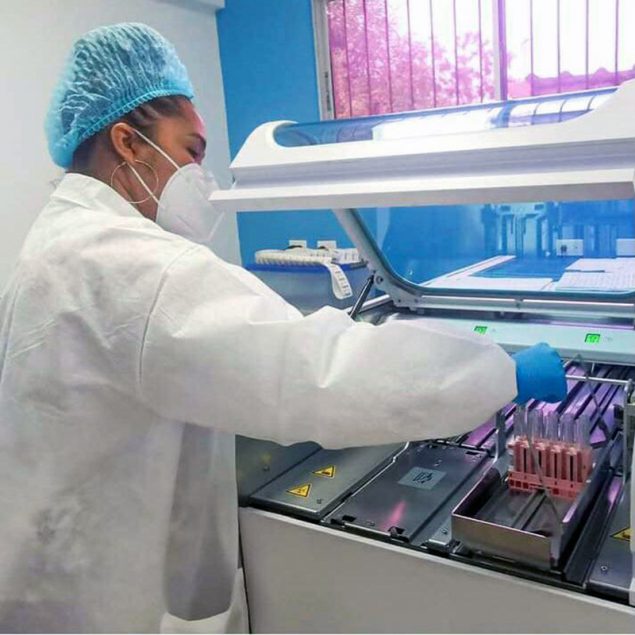CDC’s Laboratory Management Training and Accreditation Program Prepares Countries for COVID-19 Response
Summary
- Strengthening Laboratory Management Toward Accreditation – known as SLMTA— trains managers to improve laboratory operations using available resources and achieve international accreditation standards.
- SLMTA training gives laboratories in many low- and middle-income countries the ability to keep up with increased demand due to the COVID-19 pandemic.
- 100% of COVID-19 PCR samples in Central America and Mozambique are tested in SLMTA laboratories.

“1,300+ laboratories in 57 low- and middle-income countries in Africa, Asia, Latin American, the Caribbean and Oceania benefitted from SLMTA.”—Katy Yao, PhD, CDC SLMTA Global Program Director.
The virus that causes COVID-19 respects no borders and doesn’t discriminate between countries with a lot or limited resources. All countries had to step up and meet the high demand on laboratories that comes with increased testing due to the pandemic. Laboratories are at the core of any country’s ability to prevent, identify, and respond to COVID-19, HIV, TB, malaria, Ebola, and other infectious diseases.
With CDC’s support and investment in SLMTA — short for Strengthening Laboratory Management Toward Accreditation — laboratories in many low- and middle-income countries are keeping up with the increased demand.
In Central America and Mozambique, SLMTA laboratories conduct 100% of PCR testing of COVID-19 samples taken from the nose or mouth. PCR stands for polymerase chain reaction. A PCR test is the most commonly used test that can detect the virus that causes COVID-19.
Most public health facilities in Angola, South Africa, Dominican Republic, Cambodia, and Vietnam that collect or process COVID-19 samples at a public laboratory benefit from the SLMTA program by receiving training, mentorship, or quality assurance support from SLMTA-trained personnel.
What is SLMTA?
SLMTA is an international laboratory improvement program designed for countries with limited resources.
It provides a “learn by doing” curriculum with hands-on experience through a series of short courses and work-based improvement projects supported by on-site visits and mentoring. The program teaches laboratory managers how to use available resources to improve how their laboratories run.

“SLMTA will help me improve quality system management in my lab.”
Barbara Pocongo
National Institute for the Fight Against AIDS
SLMTA graduate from Angola
SLMTA launched in 2009 in Kigali, Rwanda, when laboratory accreditation was beyond reach for most sub-Saharan African countries. Since this training and mentoring program started 12 years ago, more than 1,300 laboratories in 57 countries all over the world benefited from the SLMTA training and mentoring program.
This includes 237 laboratories in 27 countries getting or keeping accreditation that meets international standards. In Africa alone, 209 laboratories in 17 sub-Saharan countries achieved this accreditation.
The SLMTA program was developed by the U.S. Centers for Disease Control and Prevention (CDC) and the World Health Organization Regional Office for Africa, in partnership with the American Society for Clinical Pathology and the Clinton Health Access Initiative.
The President’s Emergency Plan for AIDS Relief (PEPFAR), a U.S. government initiative that addresses the global HIV/AIDS epidemic, funds the program. SLMTA is PEPFAR’s flagship program for strengthening laboratory systems.
SLMTA Supports Immediate, Measurable Improvements in Laboratories

Staff from Zimbabwe’s Gweru Provincial Hospital hold up five fingers after the laboratory earns a five-star rating from the COVID-19 Laboratory Testing Certification Program (CoLTeP). This certification authorizes the hospital’s laboratory to perform COVID-19 testing. Photo by Codessa Banda/Gweru Provincial Hospital.
The director of the Africa CDC, Dr. John Nkengasong says “SLMTA is a laboratory medicine game changer.”
“SLMTA is a movement that empowers laboratory staff to work together and ultimately contribute to better patient care,” says Katy Yao, PhD, the director of CDC’s global SLMTA program. “SLMTA has inspired a generation of quality champions. It makes laboratory staff feel that their profession is valued.”
Many graduates of the program said the training helped them appreciate how important their laboratory work is for patients in their country.
“SLMTA is not just a training curriculum,” says Yao, who has been part of the CDC team guiding the program since it began. “It’s a series of training tools which have evolved over the past 12 years. In 2020, due to COVID-19, we converted the latest version of SLMTA into online training sessions.”
SLMTA graduates successfully established a quality laboratory management program in their laboratories that later expanded to their entire hospital or institution.
Many laboratory teams are inspired and more passionate about their work and accomplishments after completing SLMTA training. Some instructors and students are so inspired after completing their training, they write and sing-songs about SLMTA, like these examples from Cameroon and Vietnam.

“Completing the SLMTA course makes me feel more confident when I work in the lab.”
Shao Yan
Jiangsu Provincial Center for Disease Control and Prevention
SLMTA graduate from China
SLMTA’s Impact in the Era of COVID-19
As COVID-19 spread around the world, laboratories with SLMTA training and mentoring were well-prepared to pivot and meet the challenges of testing for the new disease.
Angola
SLMTA was crucial to the success of the COVID-19 response in Angola. The country’s National Institute of Health Research Laboratory applied the tools learned through SLMTA to quickly train 200 people to form a National Rapid Response Team composed of public, private, and military health workers. Nationwide training in specimen collection, transport, and biosafety practices was also implemented.

Laboratory Technician Eyoum Bertand prepares samples for HIV viral testing. Photo by Ndimuh B. Shancho/GHSS.
Cameroon
SLMTA had a big impact in Cameroon. Before the pandemic, five laboratories that participated in the program became the first labs to receive accreditation to international standards—not only in Cameroon, but all of Central Africa.
“When COVID-19 overwhelmed lab capacity and delayed HIV viral load testing by over a month, Cameroon’s laboratories were able to leverage the capacity developed through the SLMTA program, to resolve the backlog for testing,” said Dr. Emily Kainne Dokubo, country director of the US CDC office in Cameroon.
Lesotho
When the COVID-19 pandemic reached Lesotho in early 2020, the country didn’t have any COVID-19 diagnostic testing services. It lacked infrastructure, equipment, and human resources.
At that point, Lesotho relied exclusively on South Africa’s National Institute of Communicable Diseases laboratory to get its COVID-19 tests analyzed. This could take up to seven days, which is too long to start effective contact tracing to limit the spread of the disease.
Lesotho’s National Reference Influenza Laboratory quickly began using the SLMTA program to focus resources on adapting the lab for COVID-19 testing. By June 2021, Lesotho’s National Reference Laboratory received a five-star rating from the African Society for Laboratory Medicine.
Uganda

U.S. Ambassador to Uganda, Natalie A. Brown visits the CDC-supported National Health Laboratory and Diagnostic Services facility in Kampala, Uganda. Photo by Chris Lubega/US Embassy in Uganda.

Lab technician operates an automated viral load testing machine at the CDC-supported National Health Laboratory and Diagnostic Services facility. This machine is used to process early infant HIV tests and COVID-19 PCR tests. Photo by Chris Lubega/US Embassy in Uganda.
“Uganda was one of the earliest adopters of this program,” says Dr. Susan Nabadda Nddide, executive director of Uganda’s National Health Laboratory Systems. “We started it in 2010.”
Dr. Diane Atwine, the permanent secretary of the Uganda Ministry of Health, says her country’s participation in SLMTA has been a game changer. “Before COVID, we only had one reference lab as far as viral infections are concerned. But when COVID came, we worked with CDC, and we now have many more labs in the country that are able to diagnose COVID.”

“The SLMTA course definitely makes me a confident QMS [quality management system] specialist.”
Janet Neil
Global Epidemiology Systems Strengthening Network
SLMTA graduate from Jamaica
Mozambique
Mozambique is the first country to integrate the SLTMA training and mentoring program into its national health system. Laboratories participate in the SLMTA program to achieve minimum international quality standards. With funding from PEPFAR and technical assistance from CDC, Mozambique built a national network of quality HIV molecular SLMTA laboratories.

A lab technician processes COVID-19 tests at the Dr. Defilló National Public Health Laboratory in the Dominican Republic which CDC supports since 2008. Photo by Vergica/NPHL.
When the pandemic reached Mozambique, ten of the country’s SLMTA laboratories quickly integrated COVID-19 testing into their workflow.
“In Mozambique, SLMTA is referred to as FOGELA—which is the Portuguese translation of SLMTA: FOrtalecimento da GEstão de Laboratórios para Acreditação—because the laboratory staff wanted to make this laboratory quality program their own,” said Luciana Kohatsu, PhD. She is the deputy director of CDC’s SLMTA program and trained the first group of SLMTA laboratory staff in Mozambique.
Dominican Republic
SLMTA is also known as FOGELA (Spanish translation of SLMTA: Fortalecimiento Gerencial de Laboratorios) in Latin America. The Dominican Republic’s first COVID-19 specimen was collected by and later tested in laboratories that participated in the SLMTA/FOGELA program.
“When the virus that causes COVID-19 reached the Dominican Republic, laboratories were ready to face the pandemic thanks to lessons learned from years of SLMTA training and mentoring,” according to Hilda Rosario, one of CDC’s laboratory specialists based in this Caribbean nation. “With support from CDC and funding from PEPFAR, labs improved their accuracy, productivity, workflow, and safety,” she added.
Cambodia

Battambang Hospital referral lab staff collecting samples for COVID-19 testing. Photo by Chiek Sivhdur/Battambang Referral Hospital lab director.

Staff at Battambang Hospital referral lab, a SLMTA lab, test COVID-19 samples. Photo by Chiek Sivhdur/Battambang Referral Hospital lab director.
Ten years ago, CDC‘s office in Cambodia introduced the Cambodian Ministry of Health to SLMTA. Today, 38 national and local laboratories are participating in the program.
With CDC’s technical assistance and by implementing the SLMTA program, Cambodia’s National Public Health Laboratory received accreditation in February 2019. Consequently, this lab was well-equipped to play a major role in Cambodia’s COVID-19 response.
In addition to analyzing COVID-19 tests, Cambodia’s National Public Health Laboratory is also able to train, mentor, and evaluate other COVID-19 testing labs. It is also helping two HIV labs prepare to apply for accreditation. SLMTA training has contributed to Cambodia now having 16 COVID-19 testing sites nationwide.
Importance of Strengthening Labs Through SLMTA
COVID-19, malaria, HIV/AIDS, and cancer are just a few of the many diseases that are confirmed through lab testing. People around the world depend on laboratories to provide accurate results as quickly as possible. SLMTA is a critical tool to enhance and improve laboratory capacity, and its impact has been felt around the world.

“I promise to be a SLMTA ambassador.”
Kudakwashe Chitumbura
Biomedical Research and Training Institute
SLMTA graduate from Zimbabwe
“Bottom line: after completing the SLMTA program, laboratories are better equipped to meet international standards and it helps transform the overall health system across many resource-limited settings in a country,” says Yao.